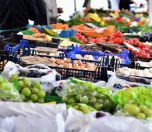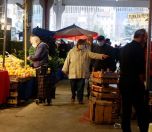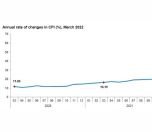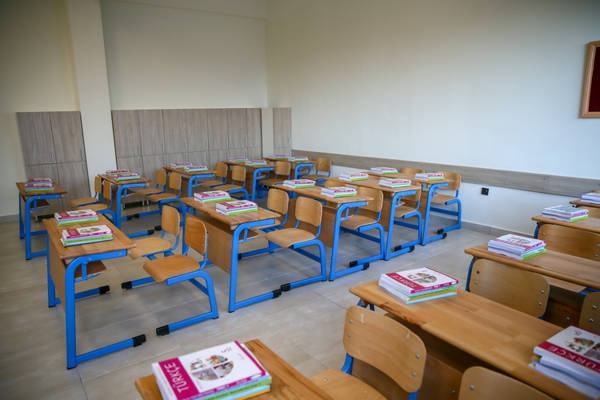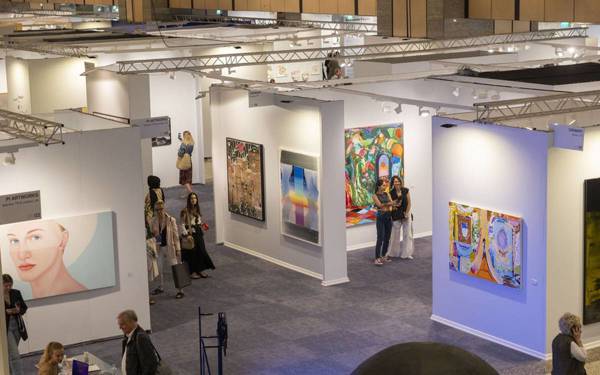* Photos: Ayşegül Özbek - bianet
Click to read the article in Turkish
Last year, a kilo of red meat cost 50 Turkish Lira (TRY). It now costs 150 TRY. A kilo of green pepper now costs 70 TRY.
While a shop would receive an electricity bill of 2,500 TRY in the last months, its electricity bill has now hit 10,000 TRY.
While bakeries were expecting to sell over a thousand pitas a day during Ramadan, this number is currently around 600.
Shopkeepers have come to be embarrassed to tell customers a price just as they are tired of listening to their problems.
As for people, they have long been fed up. "Don't ask me about the price hikes for nothing, don't stir up my troubles," says a woman shopping in Eminönü, a district known for Ramadan shopping in İstanbul.
CLICK - Expired baby food, one diaper at a time, tap water
Customers no longer buy food products by kilos or grams, but by saying, "I would like to buy 10 lira worth of..."
Abdullah Akkaya, a butcher from İstanbul's Kurtuluş neighborhood, says that the price of chicken meat has increased by 25 percent in three weeks. As for red meat, its price has increased by 100 percent since January:
People no longer buy meat by kilos, grams
"The meat delivered to us is what we call 'carcass' meat with bones. It diminishes by 25 percent. We buy it for 90 lira. We calculate the costs after removing the bones. But no one talks about this on TVs. They say, 'Butchers buy meat for 90 lira'. Yes, they do. But they sell it without the bones. In fact, meat is sold to us not for 90 lira, but for 125 lira.
"When you add the employee expenses, rent, electricity prices and all, we no longer make as much profit as we used to do.
"How can we explain this to people? They have affected the sales as well. Before the new year, a kilo of ground meat would cost 85 lira, it now costs 145 lira. Given the price increases, we should in fact sell it for higher prices. Shopkeepers cannot earn any longer, they just maintain the existence of the shop. We are constantly told by customers, 'Yet another price increase?'"
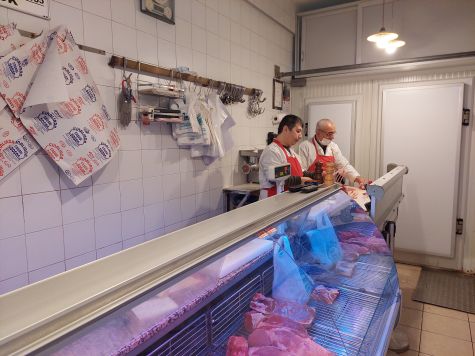
Armenian, Greek and Syriac citizens are in the majority in Kurtuluş. Akkaya reminds us that Easter is coming. Then comes the Ramadan Feast. He estimates that sales will relatively increase then:
"Customers now say, 'I cannot buy a kilo, I will buy half a kilo' or they do not say grams at all. They say, 'I would like to have 30 lira worth of...' It means a handful of meat. As they buy 50-100 lira worth of fuel, some customers also make standard purchases, saying '20 lira worth of meat, please...'"
'It is as if people fast for 12 months'
Another butcher on the same street says that their sales have almost completely stopped. "Zero minus zero," he says, adding:
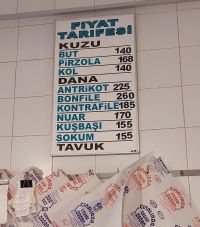
"People cannot buy meat. It used to cost 50 lira last year while it now costs 150 lira. The Ramadan month has come but it does not make any difference. Because there are 12 months in a year and it is as if people fast for 12 months. They cannot buy it..."
Üstün Palmie, a well-known bakery in Kurtuluş, has made preparations for not only Ramadan pitas but for Easter as well. The shop window is decked with colorful chocolate bunnies. Hülya Yıldıran, one of the owners of the bakery, says that the sales have dropped in the last 2 years:
'We are embarrassed to say a price'
"We are having a really hard time due to the price increases of up to 150 percent. We are having difficulty buying the raw ingredients. Plastic bags, paper, packaging... The old-style paper that we buy is no longer available in the market; we have them produced when we find them.
"We have them produced based on the current USD exchange rate. These are the products with which were are completely foreign dependent.
"When it comes to sugar and flour, they are a hot button for us. We buy them at a different price every week. Prices are very high at wholesalers. The prices at the state's sugar factory are affordable, but it is not available in the market. They sell it to markets. And we cannot buy sugar in five-kilo packages. A bakery cannot be sustained like this.
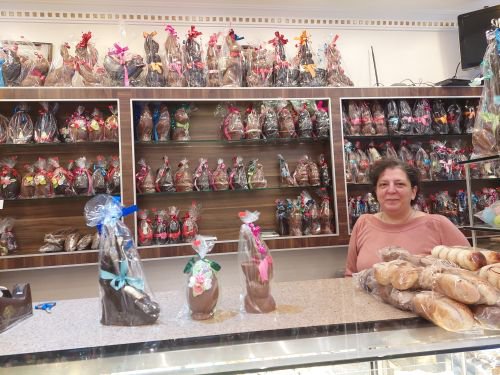
"It is also the case for the flour prices. We are now embarrassed to tell our customers a price. We had long not changed our prices.
On the one hand, we are a neighborhood bakery and say that we should support one another; on the other hand, we know that our sales will drop if we increase the prices. Instead of baking and throwing away... Because they are daily products. We found it right to not introduce a price increase, but we could endure until a certain point. We have increased the prices this week. But, in fact, our customers have been accustomed to it from the markets. They were expecting it.
'Price hikes in all ingredients of sweet yeast bread'

"Easter is approaching. But there was nothing else we could do. You cannot stand it any longer. We are constantly talking here, asking, 'How will the economy go on like this?' We are sharing our problems with our customers. They maintain a household and we maintain a shop. We are the customers of someone, too. We also have difficulty buying things. We find it difficult to make payments. Wholesaler says, 'Prices will increase, buy it'. But how will I pay for it?
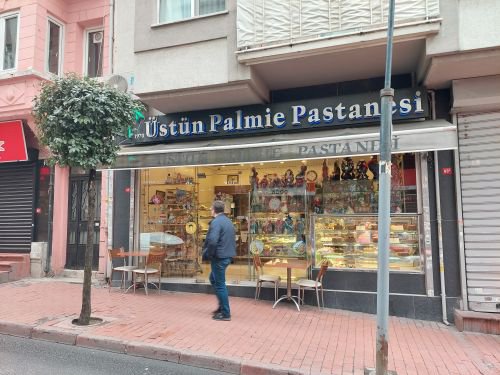
"We have not increased the price of chocolate eggs. It is something to make children happy, after all. It is a feast and we did not want to profiteer. Everyone should be happy as everyone is going through very hard times".
'Sales of pitas have dropped'
Havva Topçu is one of the partners of the bakery. She says, "Those who used to buy two loaves of bread now buy one". It is not any different with the pita, a food traditionally eaten during the Ramadan month:
"Normally, we should be selling over a thousand, but we can sell only 650. Besides, sales are usually higher in the first days of Ramadan and drop gradually. But we have already begun with low sales. And it is winter. So, no one has gone on vacation, to their village or summer house.
"We did not know what to do when the price increases first began. We increased the wages of workers. But when the bills of natural gas and electricity were increased, we found ourselves in a very difficult situation.
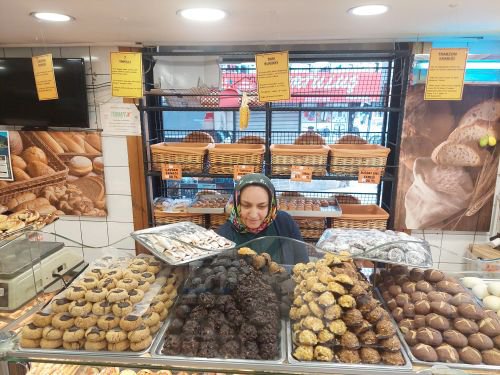
"The price of cheese has increased from 30 to 60. How will I sell something that used to cost 50 lira for 100 lira now? So, I cut it from my profit. We have started to bake less products now. I have started to bake as many products as I can sell. I have watched my performance.
"I am embarrassed to give some things, to say a price. A piece of filled pastry (börek) is 10 lira. One should buy at least two pieces for 20 lira in order to get full. 20 lira for breakfast and something beside it..."
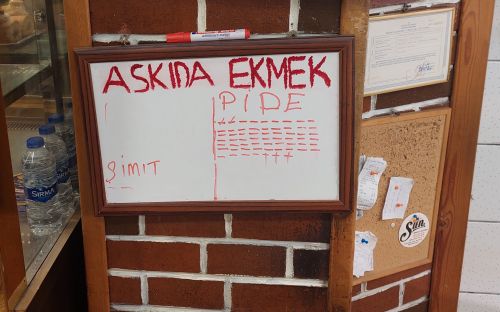
'I used to boast of low prices'
Ms. Ümran buys bagels (simit) from the bakery on her way to work. She says that the increase in prices are seriously sensed there:
"A couple of days ago, my friends came from abroad. Even they could see the difference. Even though they came with foreign currencies... Our wages have seriously melted. I am a middle class person, so I can make ends meet in some way. But there are those who are in a worse situation. I bought a pita for 7.5 lira yesterday. It is very expensive. The prices of tomatoes and peppers are already known. I used to boast of affordable prices of fruits and vegetables, I used to boast of the abundance. But we are now in a situation where we cannot even buy them. We buy less. We take something, then leave it back. I am so sorry, everyone is so unhappy..."
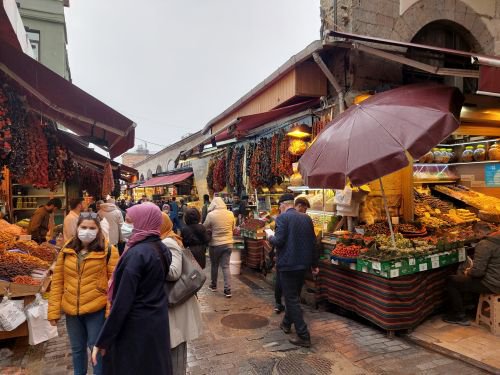
'It is not us who will recover the economy'
The owner of another bakery complains, "Customers think that we are the ones who increase the prices" and adds:
"There is a wrong idea. People have started to buy less. Customers regulate their own economy themselves. We do not want to cut back on our quality. We are trying to approach with optimism and tolerance. We just live on; it is not us who will make the economy recover".
When we speak to people about the price increases, they are mostly shocked about the prices of vegetables and herbs. "A bunch of parsley costs 10 lira, lettuce costs 15 lira... How come?," they ask.
'We are tired of changing price tags'
A green grocer tells us that she is tired of explaining themselves to customers and changing the price tags.
We change the price tags everyday. This cannot be real. A kilo of yellow wax pepper costs 50 lira. People buy 2-3 now. If you buy three pieces, it costs 100 lira in total. Customers ask us the prices, we don't remember. It is like the stock exchange. We sometimes cross with customers. They blame you and you cannot explain yourself... The sales have dropped, as expected. Some customers are used to buying without checking the price tags. When they come to the counter, it costs 150 lira. They do not buy half of what they have taken.
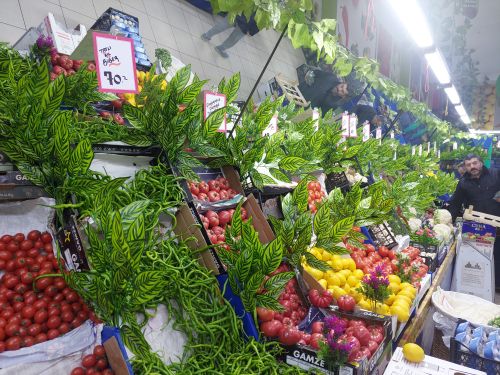
Cashiers listen to troubles the most
Cashier Çiğdem Çınar is perhaps one of the people who listen to people's problems and troubles the most.
"We have become like psychologists," she says, adding, "We are also affected when we see these prices. In fact, we react against them first. The prices of all products have increased in the past few months. Electricity bills are now higher than the rents. While the electricity bill used to stand at 2,500 lira, the last electricity bill is 10,000 lira."
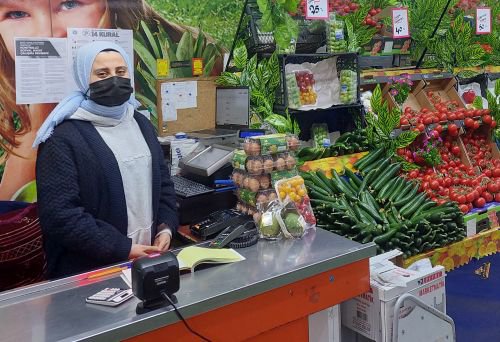
'I don't have time'
A woman shopping in the grocery store says, "What else is there to talk about these price increases? We are at a loss, we are at the rock bottom". A young person intervenes: "But everything will be okay, auntie?" She responds: "Do you really believe this? I don't have time".
A dried fruit and nut seller in Eminönü also complains about the low sales, saying, "We are waiting". He briefly adds:
'Deduct the tare weight'
It has been four days since Ramadan began. But there is no sale. It is much worse than last year. They say, 'Life has returned to normal'. But it is not any different from the pandemic for us. Nothing has changed. People are surprised when they see the prices. A woman says, 'Deduct the tare weight from the price'. A plastic bag..."
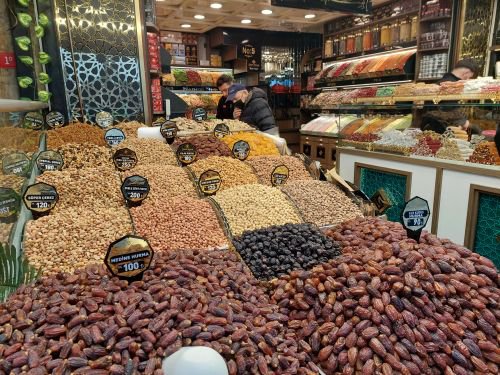
'Prices changes 3 times, sausage is the same'
A citizen comes out of a shop with a bag of sausages:
"Two weeks ago, it would cost 109 lira. A week later, it was 120 lira. It now costs 169 lira. It is sausage, they are all the same. It has nothing to do with Ramadan. Its price has increased by 50 lira. This cannot be true. I now buy half a kilo of sausage rather than one. It is the case everywhere. Lettuce prices range from 15 to 20 lira. And they are all rotten. May God help us".
'I take joker money with me'
A woman coming out of a diary shop also says:
"Do you know what demoralizes me the most? I calculate the prices of everything at home, from sugar to water, and take money with me accordingly. Then, I also take joker money with me, so to say, thinking that the prices must have increased already. The prices of one thing at one time is not the same as the one at another time.
"We used to eat out, we cannot anymore. Or we cannot trust the quality when prices are affordable. I buy daily, I do not stockpile. It also prevents waste. But prices have soared so much. I do not buy extreme things. I like tropical fruits a lot, for instance. But I cannot buy them anymore".
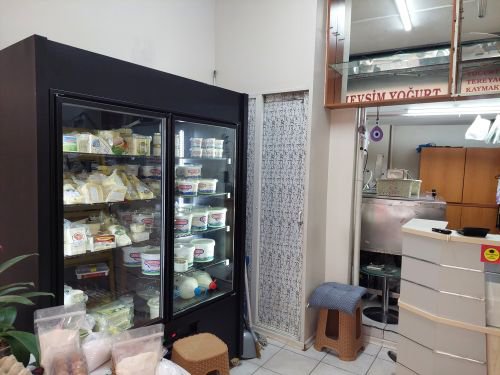
'They ask prices, leave without buying'
The owner of the dairy shop says:
"Prices have exceeded the level of perception now. I have been in this business for a short time, it is a new sector for me. We were faced with significant price increases after I took over the business in December.
"We have turned into a wailing wall. People are constantly complaining. They are examining the prices. There are those who ask the price of yogurt and eggs and leave without buying any. They check the prices in other places. Dairy prices have increased by almost 50 percent.
"Yogurt would cost 19 lira yesterday; it now costs 24 lira. Milk prices have increased from 12 to 16 lira. Cow milk... We have ecological products from Balıkesir province. Even though the product prices have not increased, delivery prices have soared". (AÖ/SD)





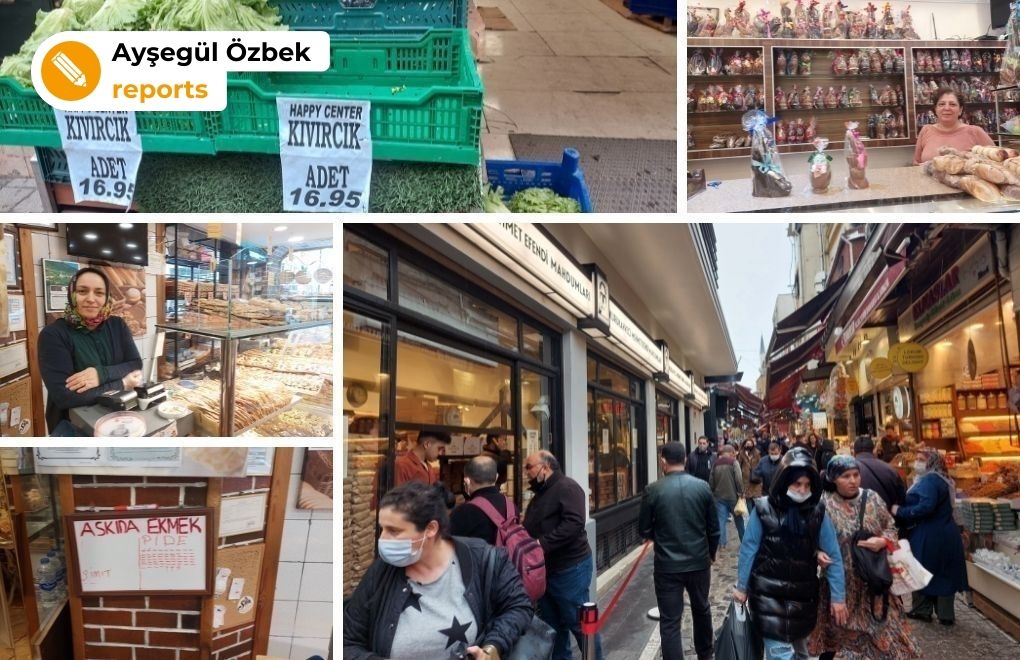
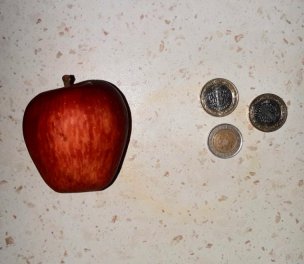

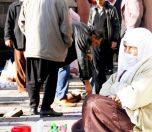

.jpg)

